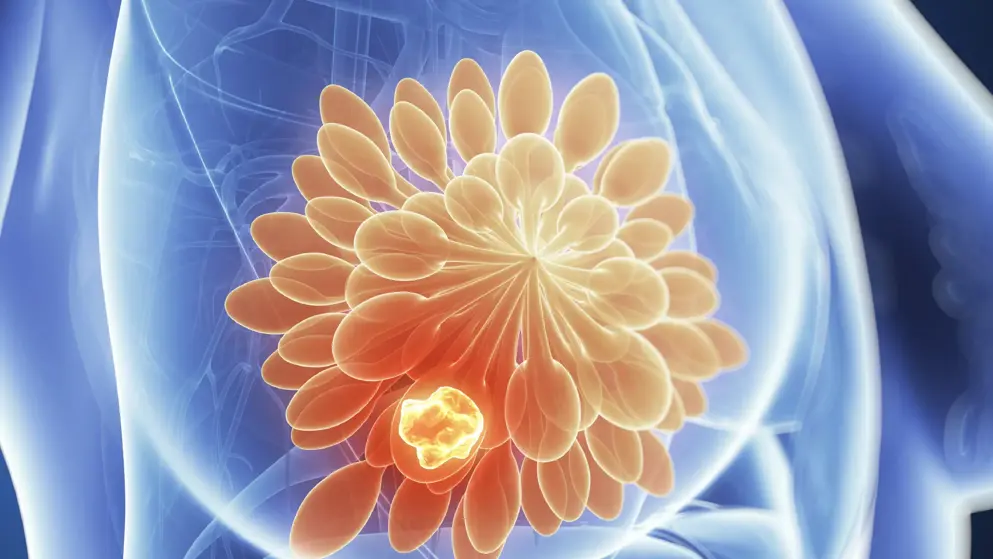
Enhertu reduced the risk of disease progression or death by 72% vs. trastuzumab emtansine (T-DM1) in patients with HER2-positive metastatic breast cancer.- AstraZeneca + Daiichi Sankyo.
Detailed positive results from the head-to-head DESTINY-Breast03 Phase III trial showed that Enhertu (trastuzumab deruxtecan), the AstraZeneca and Daiichi Sankyo Company, Limited HER2-directed antibody drug conjugate (ADC), demonstrated superior progression-free survival (PFS) versus trastuzumab emtansine (T-DM1), a HER2-directed ADC currently approved to treat patients with HER2-positive unresectable and/or metastatic breast cancer previously treated with trastuzumab and a taxane. Results were presented in a Presidential Symposium at the European Society for Medical Oncology (ESMO) Congress 2021.
Results At a prespecified interim analysis of DESTINY-Breast03, Enhertu demonstrated a 72% reduction in the risk of disease progression or death compared to T-DM1 (hazard ratio [HR] 0.28; 95% confidence interval [CI] 0.22-0.37; p=7.8x10-22). After 15.5 and 13.9 months of follow-up in the Enhertu and T-DM1 arms respectively, the median PFS for patients treated with Enhertu was not reached (95% CI 18.5-NE) compared to 6.8 months for T-DM1 (95% CI 5.6-8.2) as assessed by blinded independent central review (BICR). In the key secondary endpoint of PFS assessed by investigators, patients treated with Enhertu experienced a three-fold improvement in PFS of 25.1 months versus 7.2 months for T-DM1 (HR 0.26; 95% CI 0.20-0.35; p=6.5x10-24). A consistent PFS benefit was observed in key subgroups of patients treated with Enhertu, including those with a history of stable brain metastases. There was a strong trend towards improved overall survival (OS) with Enhertu (HR 0.56; 95% CI 0.36-0.86; nominal p=0.007172), however this analysis is not yet mature and is not statistically significant. Nearly all patients treated with Enhertu were alive at one year (94.1%) compared to 85.9% of patients treated with T-DM1. Confirmed objective response rate (ORR) more than doubled in the Enhertu arm versus the T-DM1 arm (79.7% vs. 34.2%). Forty-two (16.1%) complete responses (CR), and 166 (63.6%) partial responses (PR) were observed in patients treated with Enhertu compared to 23 (8.7%) CRs and 67 (25.5%) PRs in patients treated with T-DM1.
Javier Cortés, MD, PhD, Head, International Breast Cancer Center (IBCC), Barcelona, said: “Patients with previously treated HER2-positive metastatic breast cancer will typically experience disease progression in less than a year with available HER2-directed treatments. The high and consistent benefit seen across efficacy endpoints and key subgroups of patients receiving Enhertu in DESTINY-Breast03 is remarkable and supports the potential of Enhertu to become the new standard of care for those who have previously been treated for HER2-positive metastatic breast cancer.
Susan Galbraith, Executive Vice President, Oncology R&D, said: “Today’s results are ground-breaking. Enhertu tripled progression-free survival as assessed by investigators, and provided a disease control rate exceeding 95% compared to 77% for T-DM1 in DESTINY-Breast03. In addition, the safety profile was encouraging with no Grade 4 or 5 interstitial lung disease events in this trial. These unprecedented data represent a potential paradigm shift in the treatment of HER2-positive metastatic breast cancer, and illustrate the potential for Enhertu to transform more patient lives in earlier treatment settings.”.
The safety profile of the most common adverse events with Enhertu in DESTINY-Breast03 was consistent with previous clinical trials with no new safety concerns identified. The most common Grade 3 or higher treatment-emergent adverse events in the Enhertu arm were neutropenia (19.1%), thrombocytopenia (7.0%), leukopenia (6.6%) and nausea (6.6%).There were 27 cases (10.5%) of treatment-related interstitial lung disease (ILD) or pneumonitis reported, as determined by an independent adjudication committee. The majority (9.7%) were low Grade (Grade 1 or Grade 2), with two Grade 3 (0.8%) events reported. No Grade 4 or Grade 5 ILD or pneumonitis events occurred.
DESTINY-Breast01 Updated Results : Updated results from the pivotal DESTINY-Breast01 Phase II trial were also presented at ESMO and showed that Enhertu (5.4 mg/kg) continued to demonstrate impressive efficacy and durable responses in patients with HER2-positive metastatic breast cancer following two or more prior HER2-based regimens.
With a median duration of follow-up of 26.5 months, a continued increase in response was seen in patients treated with Enhertu with an updated ORR of 62.0%, including one additional CR (7.1%). A median duration of response (DoR) of 18.2 months was also observed. The median PFS was 19.4 months. In an exploratory analysis of OS with a median follow-up of 31.1 months, evaluated at a greater maturity (52%), the updated median OS was 29.1 months.
The overall safety and tolerability profile seen with Enhertu in DESTINY-Breast01 continues to be consistent with what has been previously observed. There has been one new case of treatment-related Grade 1 ILD or pneumonitis determined by an independent adjudication committee as of data cut-off of March 26, 2021.

